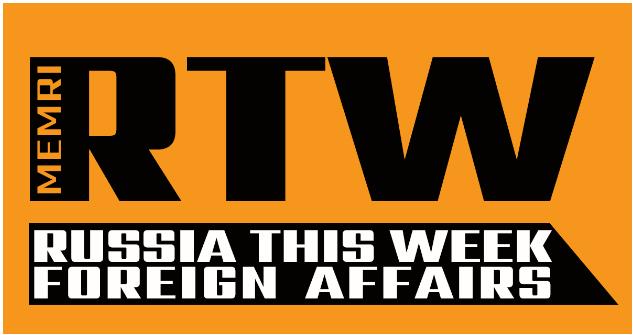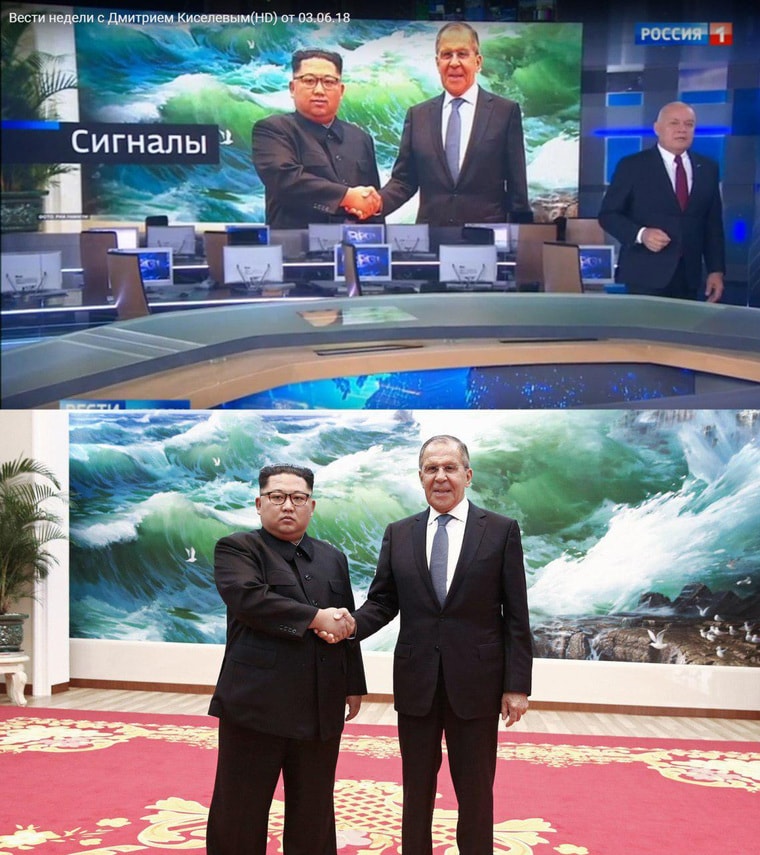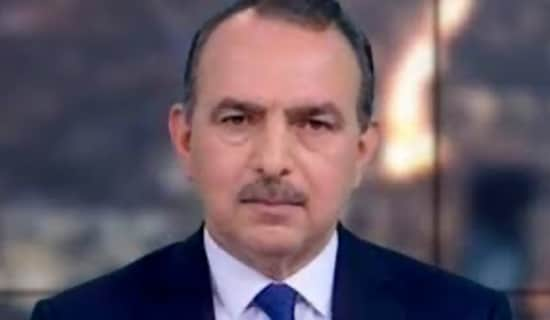Russia This Week is a weekly review by the MEMRI Russian Media Studies Project, covering the latest Russia-related news and analysis from media in Russia, the Caucasus, Central Asia, and Eastern Europe.

Photo Of The Week

Russia plays host to the 2018 FIFA World Cup from June 4 to July 15. (Image source: Varzesh11.com)
Photoshop Of The Week:

Russian state television Rossiya -1 photo-shopped a photo of Russian Foreign Minister Sergey Lavrov with the North Korean leader Kim Jong-un, in Pyongyang, on May 31, 2018. The Russian TV channel added a smile on Kim's face. The upper photo is the one that has been broadcast, the lower one is the original picture taken in Pyongyang. The retouched picture has been aired during Rossiya Segodnya Director General and senior host Dmitry Kiselev's flagship weekend program.
(Ura.news, June 4, 2018)
In The News:
Will Putin Meet Trump?
Commenting on a possible Trump-Putin meeting, Kremlin Aide Yuri Ushakov said:
"Our president mentioned at the St. Petersburg forum that Russia and the U.S. certainly have something to discuss, but there have been no particular preparations yet and in this context it's still March 20 on the calendar when during a phone conversation [with Putin] Trump suggested considering the possibility of holding this meeting… Now, however, the issue on where and when [to hold the summit] is up in the air."
(Tass.com, June 4, 2018)
Kremlin Spokesman Dmitry Peskov stated:
"So far, there is still a lack of specific details after the last phone conversation between Putin and Trump, which discussed the two presidents' understanding on the need for contact. The lack of initiative by of our U.S. partners remains."
(Tass.com, June 4, 2018)
Peskov also said:
"Various cities, which can be suitable for a meeting between the two presidents, are often considered. You know that the two presidents discussed the need for such a meeting during their latest telephone conversation, including that Vienna could be such a city… However, there are no specific agreements, specific understandings or specific discussions at the moment. That is, nothing has changed in this respect."
(Tass.com, June 9, 2018)
Russian President Vladimir Putin told the Rossiya-1's Saturday News with Sergei Brilev:
"We believe that such personal meetings are expedient and not only possible. We met with the U.S. president at various international venues. But, of course, this does not offer a possibility to pay necessary and due attention to Russian-U.S. relations…
"Generally, I consider such a meeting to be useful. The only question is that the internal political situation in the United States should make it possible to do this…
"My experience of communication with the U.S. president suggests that although his actions are frequently criticized, especially lately, including on the international scene and in the economic sphere, this experience tells me after all that he is a thoughtful person who can listen to and who responds to arguments given by his interlocutor. All this provides me with grounds to believe that the dialogue can be constructive."
(Tass.com, June 9, 2018)
Syria As The Main Issue For Discussion During A Possible Full-Fledged Trump-Putin Meeting
The Russian news agency Tass reported that the Saudi-owned newspaper Asharq Al-Awsat said that the U.S. is ready to pull out the opposition from the southern areas and even dismantle its Al-Tanf base in exchange for the withdrawal of Iranian and pro-Iranian forces. The point of contention is how far the forces controlled by Tehran should retreat.
(Tass.com, June 5, 2018)
Gazprom – The European Commission Ended Its Longest-Running Anti-Trust Case against Gazprom Without Imposing Fine
Expert Danila Bochkarev explained the European Commission's ruling on Gazprom in an article, titled "What Gazprom's Accepting EU Rules Of The Game Means For European Energy Security."
Below are excerpt of Bochkarev's article, published by the Valdai Club:
"… On May 24, the European Commission ended its longest-running anti-trust case against Gazprom without imposing fine on the Russian gas company. The investigation, which began in 2011, could have led to a fine of as much as 10% of Gazprom's turnover, or roughly $9 billion. The Commission's anti-trust authority has an impressive track record of imposing fines on top global businesses. For example, in May 2009 Intel was fined for 1.06 billion euro for abusing its market dominance in IT equipment. In June 2017, Commission fined Google for 2.42 billion euro for 'abusing dominance as search engine by giving illegal advantage to own comparison shopping service.' Many analysts and commentators expected that Gazprom would be the next large company to be fined by the European Commission.
"However, instead of fining Russia's largest energy company, the EU anti-trust authority decided to impose on Gazprom 'a detailed set of (legally binding) rules that will significantly change the way Gazprom operates in Central and Eastern European gas markets'. In case of non-respect of these rules, the Commission can still 'impose a fine up to 10 % of the company's worldwide turnover.'
"What are the obligations imposed on Gazprom and why are they reducing the importance of security of supply issues for the European Union?
"The four pillars of the deal are:
"Destination closes must be abolished – therefore, Gazprom's customers have the right to re-sell gas both at home and abroad, thus contributing to the European gas market liquidity and natural gas price alignment between different member states of the European Union.
"Gazprom has to offer competitive price for its natural gas supplies to Central and Eastern Europe (CEE) in line with the Western European hubs' benchmarks, namely TTF in Netherlands and NCG in Germany. Currently, gas prices in Central and Eastern Europe are relatively low as gas price is often linked to the oil/oil products basket averaged over 6-9 months with a 3-6 month time lag. This condition means that Gazprom would not be able to benefit from an increase in oil prices in case the prices it charges in CEE significantly diverge from that on gas hubs in Western Europe.
"Gazprom cannot act on any advantages concerning gas 'infrastructure, which it may have obtained from customers by having leveraged its market position in gas supply.' According to this point, Bulgaria is formally held immune from lawsuits for its cancellation of the South Stream project in 2014. Therefore, Gazprom guarantees that it will not seek “any damages from its Bulgarian partners”.
"Last but not least: Gazprom will have to take 'active steps to integrate gas markets in Central and Eastern Europe.' This point – a formality at first glance – is perhaps the most important piece in the Commission's decision. New energy infrastructure built in CEE – mostly with the EU funds – has increased interconnectivity between the “old” and “new” member states. Therefore, the Czech Republic, Hungary, Poland and Slovakia are already fully integrated in the European single gas market. In contrast, the interconnectivity of Bulgaria, Estonia, Latvia and Lithuania with the neighboring member states is not yet fully developed. According to the Commission's plan, Gazprom will contribute to the interconnectivity of these semi-isolated markets not by building new infrastructure, but by giving its customers the right to deliver gas to and from these countries. This option will be available for the owners of the contracts for delivery of gas to CEE and will be applied to contracts with a duration of at least 18 months. In practice, it will mean that the companies that have bought gas 'originally for delivery to Hungary, Poland or Slovakia, can choose to have Gazprom deliver all or part of it to Bulgaria and/or the Baltic States instead (and vice versa)'. Therefore, European energy companies will be able to directly compete with Gazprom across the Union. Furthermore, Gazprom – together with the Connecting Europe Facility (CEF) – will contribute to the integration of European gas markets/market liquidity and lower energy prices for European consumers.
"Thus, Gazprom – often accused of using energy as a 'weapon' – is de facto taking legally binding obligations to complete the 'construction' of a single gas market. Non-respect of these commitments will result in fines, which will be higher than any potential gains that might be expected from infringement. At the same time, Gazprom critics lose their strongest argument – that the company is able and willing to misuse the EU market rules. Objective commercial interest in the EU gas market and commitments imposed on Gazprom by DG COMP will encourage this company to play by the rules in Europe."
(Valdaiclub.com, June 7, 2018)
G7
Russian Foreign Minister Sergey Lavrov stated that Russia never asked to be readmitted to the G8.
Lavrov said: "When our western partners decided to return to the G7 format, we accepted their decision and have been working on other platforms since then… Ultimatums are not enough for the G20, one needs to make agreements there. The Group of 20 is a mechanism for achieving consensus. I believe it is the most promising platform for the future."
(Tass.com, June 9, 2018; See also Special Dispatch No. 7447, Russia This Week – April 29, 2018, April 29, 2018.)
Iran' Nuclear Deal
Commenting on the U.S. exit from the Iran nuclear deal, Russia's Permanent Representative to International Organizations in Vienna Mikhail Ulyanov said:
"We proceed from the fact that the US decision to tear up the 2015 comprehensive accords actually deprives the American side of all the rights under the JCPOA and UN Security Council Resolution 2231…
"We express the hope that the comprehensive accords on the Iranian nuclear program will still work for the benefit of peace and stability. The Russian side will contribute to this in every possible way…
"We deeply regret that the US' ill-thought-out and unsubstantiated policy line on the JCPOA undermines trust for the international system of the IAEA's guarantees and casts a shadow on the agency's conclusions and prestige in the area of inspections. In total, all these factors unravel the nuclear weapons non-proliferation regime based on the Treaty on the Non-Proliferation of Nuclear Weapons, against which Washington has dealt a serious blow, without giving any thought about it or considering its implications."
(Tass.com, June 6, 2018)
Following the news that Iran will resume uranium enrichment if it cannot find a way to save the nuclear deal, Russian Senator Konstantin Kosachev, Chair of the Russian Federation Council Committee on Foreign Affairs, accused the U.S. of being a "global provocateur":
"The U.S. adventurist policy is apparently aimed at the artificial exacerbation of complex problems, rather than at resolving them. Washington is behaving like a global provocateur – as in the case of the constantly 'suspended' dialogue with North Korea, illegitimate strikes on Syria, the embassy transfer to Jerusalem, etc."
Referring to the Iranian conditions presented to the EU in order to maintain the nuclear deal following its renunciation by the U.S., Kosachev said:
"In fact, [Khamenei] demanded of [the EU] to make the U.S. a pariah [state]: to condemn the U.S. breach of 2231 UNSC resolution, which supported the JCPOA signing, to collectively oppose American sanctions and to guarantee the conduct of operations between Iran and European banks. It's tough but quite logical: it was not Tehran that exited the agreement - the U.S. is more a real threat to Iran, than Iran is to the U.S.
"It looks like as if the U.S. is convinced that under peace conditions, it will gradually lose ground to the advantage of other power centers, while escalating conflicts towards 'an explosion' will provide the U.S. as the strongest power with more chances [to maintain the leading positions] through weakening all the other [players]."
He added: "It turned out that the world may solve any problem, to get to an agreement with such a problematic and ideological partners as North Korea and Iran, but the world is not capable to solve the 'American problem,' while this problem is moving to the foreground."
(Interfax.ru, June 5, 2018)
News In Brief:
- Russia and Rwanda are developing military and technical cooperation and both sides are discussing the deliveries of Russian air defense systems, Russia's Foreign Minister Sergey Lavrov said after negotiations with his Rwandan counterpart Louise Mushikiwabo. (Tass.com, June 3, 2018; read the full article).




